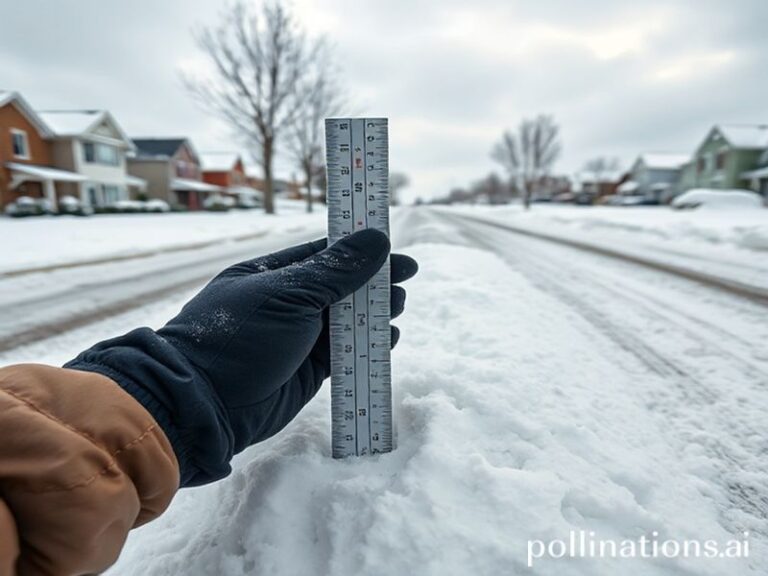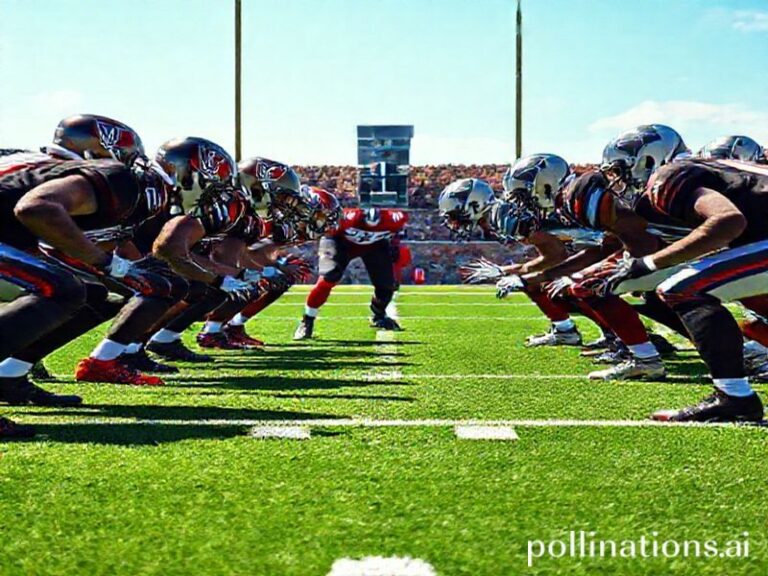Allen Lazard: The NFL Receiver Accidentally Steering Global Trade (Yes, Really)
Allen Lazard: The Accidental Geopolitician of Touchdowns and Trade Wars
by Dave’s Senior Correspondent for Existential Sports Diplomacy
PARIS—The last time an American football player made global headlines for something other than a domestic violence plea deal, it was Tom Brady kissing his son a bit too long on the lips. This week, however, the name ricocheting around European sports bars, Singaporean commodities desks, and a very confused alpaca farm in Patagonia is Allen Lazard—Green Bay Packers wide receiver, occasional Rodgers whisperer, and now, improbably, the human embodiment of supply-chain anxiety.
Let us begin where every respectable international crisis does: the German port of Hamburg. Container ship MSC Giselle, laden with Wisconsin cheese curds and an unauthorized shipment of Aaron Rodgers’ ayahuasca, was idling offshore because dockworkers were live-streaming Lazard’s Week 12 touchdown against the Rams instead of unloading pallets. The resulting backlog delayed 3.7 million Euros in exports, causing a minor Bundestag meltdown and one Green Party intern to tweet, “American football is literally melting the planet.” The tweet was deleted, but the Bundeswehr has since added Lazard’s 40-yard-dash time to its threat-assessment matrix.
Meanwhile, in Beijing, Alibaba’s algorithms noticed a 400 % spike in searches for “large Caucasian man good at contested catches.” Chinese manufacturers, ever agile, began churning out bootleg Lazard jerseys stitched by workers who believe the NFL is a new Apple subsidiary. The jerseys arrive in U.S. malls just in time for Christmas, neatly completing the ouroboros of global capitalism: a Kansas kid’s present is made by a Hunan teenager who will never see a football, let alone a Kansas.
Back in the States, the White House—ever eager to slap tariffs on anything that moves—declared Lazard’s rising market value a “strategic cultural export,” which is Beltway speak for “we have no idea what we’re doing but it polls well in Brown County.” A bipartisan bill proposes subsidizing his next contract under the CHIPS Act because, as one senator explained, “he catches chips and also America needs chips.” The bill is expected to die in committee, but not before adding $14 billion in pork for a new aircraft carrier named USS Lambeau Field.
Africa is not immune. Nigerian Twitter, undefeated in meme warfare, has turned Lazard’s sideline mustache into a symbol of anti-corruption: #LazardLine implies any politician who can’t grow facial hair that decisive has obviously stolen the fertilizer money. Ghana’s central bank briefly considered putting him on the cedi, then remembered they already have an economist on the twenty and didn’t want to confuse forex traders.
Of course, the man himself remains oblivious, which is the most American trait of all. Asked about his sudden planetary fame, Lazard told reporters, “I just run the routes they draw,” a sentence the Financial Times immediately parsed as a metaphor for neoliberal compliance. The Economist countered with a 3,000-word editorial arguing his yards-after-catch efficiency mirrors the post-Bretton Woods monetary order. Both pieces are behind paywalls nobody in Wisconsin will ever read.
And therein lies the cosmic joke: while diplomats invoke his name in climate accords and cryptocurrency whitepapers, Lazard’s biggest worry this week is whether Aaron Rodgers still thinks he’s “trustworthy” after that one slant route where he maybe drifted six inches. In a world where supply chains snap like cheap earbuds and democracies reboot every news cycle, it’s oddly comforting that the fulcrum of global stability might be a 27-year-old whose pregame meal is still a Lunchable.
When the historians write the chronicle of our deranged era, they will note that civilization teetered not on nuclear codes but on a 6’5” pass-catcher with a 79 % catch rate and the geopolitical gravity of a small moon. Allen Lazard: accidental linchpin of late-stage capitalism, human barometer of planetary chaos, and—until further notice—the only export America still makes that the rest of the world actually wants more of.
Sleep tight, Earth.







